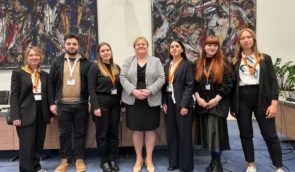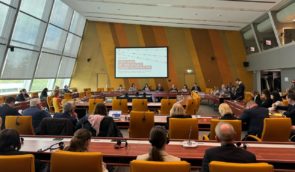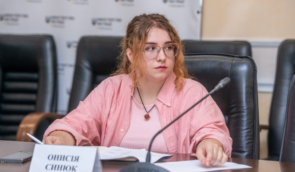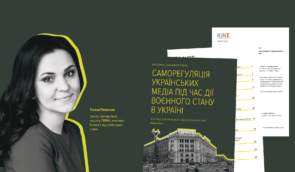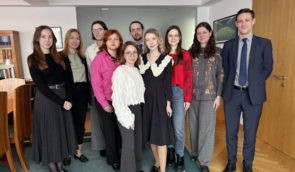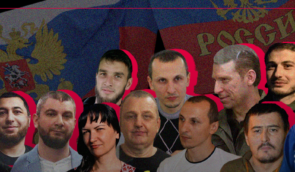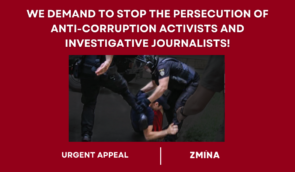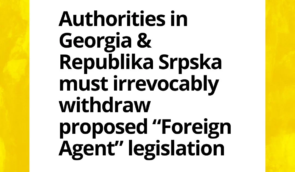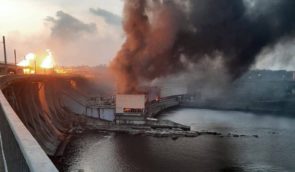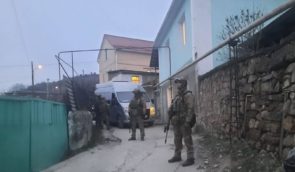Justice for Journalists Foundation and Human Rights Centre ZMINA submitted a written contribution to the UN Human Rights Committee
The 134th Session of the UN HRC will review Russia’s compliance with its obligations under the International Covenant on Civil and Political Rights and will take place on 28 February 2022 – 25 March 2022.
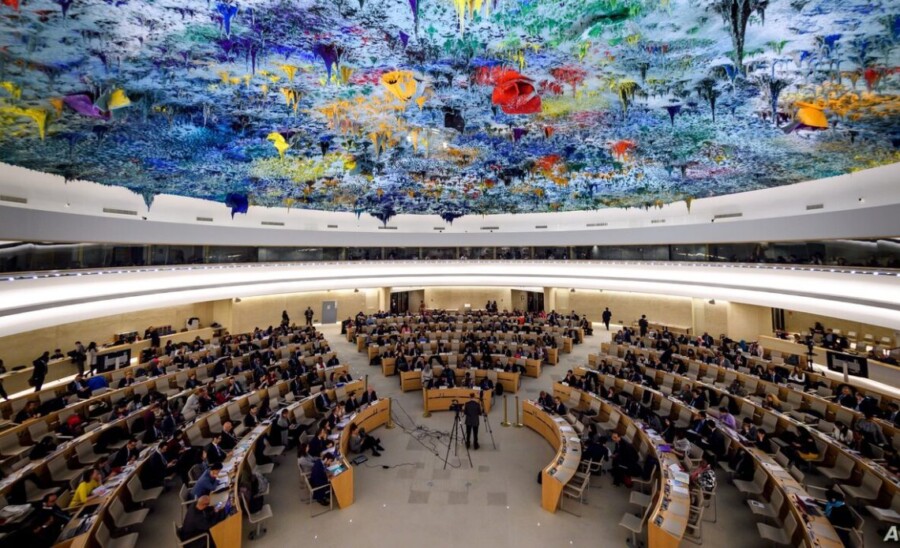
Photo credit: Plataforma
The focus of the submission is the situation of media workers and media outlets since the consideration of Russia’s seventh periodic report in March 2015 and Russia’s compliance with its obligations enshrined in Article 19 of the International Covenant on Civil and Political Rights (ICCPR).
Due to the illegal occupation of the Autonomous Republic of Crimea and the city of Sevastopol, Ukraine (hereinafter “Crimea”) by the Russian Federation since 2014, this submission recognises the responsibility of Russia as an occupying power to respect and ensure a wide range of human rights in Crimea in the framework of its international obligations, including the ICCPR.
In 2020, 58 cases of pressure on media workers and media outlets were documented in Crimea. Four of them were physical attacks and threats, 16 – non-physical attacks and threats online and offline. In 38 instances, judicial and economic means were used to exert pressure. In most cases (about 86 %) the perpetrators were representatives of the authorities. In 2021, at least nine physical attacks and threats, 33 non-physical attacks and threats online and offline, and 96 instances of judicial and economic attacks were documented. In 51 cases, the pressure on media workers combined several methods. Such instances targeted the same 11 media workers, which shows that the most critical media workers are particularly targeted.
In 2017-2020, Justice for Journalists Foundation documented 2 417 cases of pressure on media workers and media outlets in Russia (excluding occupied Crimea). Three hundred fourteen of them were physical attacks and threats, 324 – non-physical attacks and threats online and offline. In 1 779 instances, judicial and economic means were used to exert pressure. In most cases (about 83 %), the perpetrators were representatives of the authorities.
Some of the significant recent developments in Crimea included:
1) Criminalisation of citizen journalists
In 2017-2021, charges were brought against ten Crimean Tatar citizen journalists from the Crimean Solidarity initiative for their alleged participation in Hizb ut-Tahrir (the Supreme Court of Russia banned it as a terrorist organisation in February 2003; however, it is legal in Ukraine and the majority of other countries) and preparing a forcible seizure of power.
As a result, nine of them were imprisoned (one person has already served his sentence, four citizen journalists are in colonies and prisons with 14-19-year sentences, one person is under house arrest facing a 12-year term, and four persons are in predetention centres awaiting the trial verdicts).
In addition, in March 2021, occupation authorities in Crimea arrested a freelance journalist of the Radio Free Europe / Radio Liberty “Crimea. Reality” project Vladyslav Yesypenko and fabricated a criminal case against him. Yesypenko was tortured in detention, and independent lawyers were denied access to him for 27 days. Prosecutors had asked the court to sentence the journalist to 11 years in prison. He was sentenced to 6 years in prison and fined 110,000 rubles (about $1 464).
2) Blocking of Ukrainian media outlets
The monitoring covering of Crimea’s internet providers shows that at least 25 websites of Ukrainian media outlets are fully blocked in Crimea, and five more are blocked in some areas or depending on a provider.
Monitoring of FM band broadcasting in the north of Crimea shows that the signal of Ukrainian radio stations is accessible in only seven out of 19 population centres. Blocking of signals is implemented by broadcasting Crimean and Russian radio stations on the frequencies of Ukrainian broadcasters.
3) Main methods of pressure
Russian restrictive laws are also enforced in Crimea, and, as of the end of 2020, judicial and economic means were the most widely-used way of applying pressure on media workers. They mainly included the charges of extremism, links with terrorists, inciting hate, rehabilitation of Nazism, high treason, and calling for the overthrow of the constitutional order.
The second most-used category of pressure in 2020 was non-physical pressure, in particular illegal impediments to journalistic activity and denial of access to information. These were primarily related to restricting access of the press to the trials.
Finally, in 2020, four physical attacks were documented. These included two cases of punitive psychiatry use. While this represents a significant improvement – in contrast with 2014, when over a hundred instances were reported in the first month of the occupation alone – the likely explanation is that the media environment has been significantly damaged and long-term imprisonment is broadly used instead to silence critical voices.
4) COVID-19 restrictions
The restrictions largely limited the opportunity for media workers (especially citizen journalists) to work because they were restricted from leaving their places of residence and observing the trials. Overall, nine attacks connected with quarantine restrictions were recorded in 2020.
The Human Rights Committee is encouraged to urge the government of the Russian Federation to:
- Acknowledge the contribution of independent media workers and media outlets in Russia and the occupied Crimea to society, and refrain from applying stigmatising labels or encouraging smear campaigns against them;
- Repeal or revise legislation that unduly limits the freedom of expression to bring it into conformity with the strict requirements of necessity and proportionality in article 19 (3) of the ICCPR;
- Ensure the protection of media workers in Russia and occupied Crimea from any undue pressure related to their journalism and emanating from the representatives of the authorities or any third parties;
- Release all media workers detained and imprisoned in Russia and the occupied Crimea for the exercise of their right to freedom of expression and for carrying out their legitimate media work; and
- Promptly, effectively, independently and impartially y investigate all killings of media workers, as well as reports of attacks or threats against them, bring those responsible to justice, including those with direct and supervisory responsibility, in fair trials and ensure effective remedies to the victims
Note:
Justice for Journalists Foundation (JFJ) is a British non-governmental organisation created in 2018. JFJ has been monitoring, analysing, and publicising attacks against media workers1 that took place in 12 post-Soviet states, including Russia, since 2017 and in the occupied Crimea – since 2020. The monitoring is based on content analysis of open sources in Russian and English. In addition, expert interviews with media workers are used to monitor cases that have not been publicly reported. All information is verified using at least three independent sources. JFJ also funds journalistic investigations into violent crimes against media workers and helps professional and citizen journalists to mitigate their risks.

